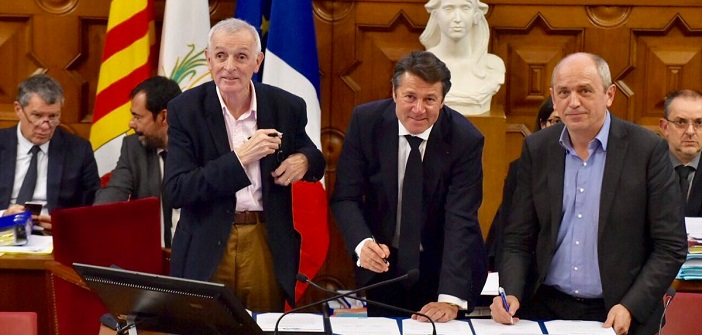Sure, :
The metropolitan council was convened to examine and vote on an ecological plan composed of 8 axes and consisting of 31 actions.
A lively debate was feared, but in the end, everything went smoothly, with the final vote demonstrating near-unanimous support for “the ecological will” – as defined by Christian Estrosi – during the deliberation of this energy transition plan that moves in the direction of a sustainable development model.
A lively debate was feared, but in the end, everything went well, with the final vote demonstrating near-unanimous support for “the ecological will,” according to Christian Estrosi, during the deliberation of the energy transition plan.
Even the fiery ecologist Councillor Fabrice Decoupigny, whose amiable exuberance was anticipated, limited himself to a few comments here and there.
In this calm “climate,” the most innovative part, the signing of the Finance-Climate Pact, did not resonate with the opposition (2 votes against – RN – and 3 abstentions – DvD).
Presented by two experts, climatologist Jean Jouzel and economist Pierre Larrouturrou, this appeal, already signed by 93 deputies and 300 personalities, aims at creating a climate bank at the European level, with funds estimated at 2% of each country’s GDP and financed by a European tax on the dividends of large industrial and financial groups. This initiative would allow substantial interventions by financing ambitious projects.
A project not easy to implement, akin to a crusade, but one that can rely on the pressure of a public opinion increasingly sensitive to this theme: “The Academy of Sciences unanimously recognized that climate change is caused by human activity,” pointed out Jean Jouzel, who worked for 13 years as co-director of the International Panel on Climate Change, “therefore, it is up to us to remedy it.”
Christian Estrosi took advantage of this debate to remind that the 2019-2024 Climate Plan is being developed and will be presented to the Metropolitan Council in the first quarter of 2019.
Regarding the many other statements and proposals (8 axes and 31 actions in total), whose realization is estimated to cost 80 million euros by 2020 (currently, it is 75 million euros), the long list presented by about ten delegates focused more on the methodology than on the content.
It is in this light that one should read the criticism from Dominique Boy-Mottard (DvG): “One might have thought of a more global approach rather than dispersion with about ten rapporteurs on the whole set of measures.”
The tone becomes more caustic and somewhat sharp: “The Metropolis is not going to provide extra funds. Where is the political will that would require additional financial means? This is a shame because, although well-intentioned, one has a bit of the feeling of a vast communication operation.”
The suspicion that Christian Estrosi is taking advantage of a compelling argument (sustainable development) to stage a communication maneuver is quite present in the remarks of Marie-Christine Arnautu (RN): “While we are not fooled by the communication artifices being deployed, we also intend to contribute to the debate by offering 5 key proposals to build the future of a sustainable Nice Metropolis.”
And to enumerate them:
1. Stop the concrete development of the Var plain to make it the granary of the Metropolis
2. Develop energy autonomy for the communes in valleys and mountains
3. Aim for 50% local products in school canteens
4. Abolish the use of plastic bags along the entire coastline
5. Include a social and environmental, local proximity clause in public procurement criteria
What can be said? It reflects the ideological approach of the political formation in which the representative (European deputy) is involved.
Moreover, she does not hide it: “Work, produce, consume, and recycle as close as possible to where we live, in short, relocate economic activities and re-root people, that’s a future project that allows for minimizing social and environmental impacts.”


